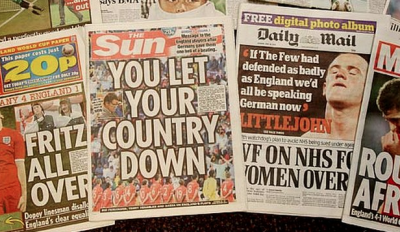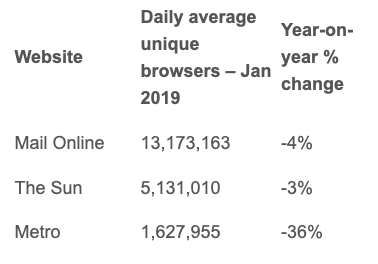The Mainstream Media – The Good, Bad and Downright Ugly

While the European media is generally known to be mostly objective in its reporting, the highly partisan nature of British coverage into the events that shape our world view is, without any doubt deepening the political and social divide.
Broadsheets and broadcasters are typically consumed by the middle to upper class, whereas the tabloids are generally aimed at the working class. And as 60 per cent of Britons identifies themselves as working class, it is hardly any surprise that the tabloids are popular.
It is also known that a right-wing ideology and bias dominates British news. This was confirmed by a YouGov survey, that to be fair, only stated the obvious – The Mail, Express, Sun, Telegraph and Times were all identified as right-wing, but that is also outnumbered the leftist thinking of the Daily Mirror and The Guardian. The Independent was seen as slightly left of centre.
It is true to say then that the sensationalist ‘tabloids’ hold considerable political clout and sway over public opinion.
In the most recent example of analysis of this right-wing bias dominating our world view, one only has to look at a Reuters Institute for the Study of Journalism analysis, which found that in the run-up to the Brexit vote, 41 per cent of articles about the Referendum was pro-Brexit, while only 27 per cent advocated remaining in the EU.
As expected, the UK’s leading newspapers – The Sun, the Daily Mail, The Daily Telegraph and the Daily Express – published a steady stream of anti-EU reporting – also known as to most of us as propaganda or fake news.
This distortion of the national narrative ought to be taken very seriously as we form our own opinions around what we see, read and experience and the mainstream media are very much a part of that.
One way of looking at this distortion is to analyse the number of complaints received by The Independent Press Standards Organisation or IPSO. It was established in September 2014 following the windup of the very public failure of the Press Complaints Commission, which had been the main industry regulator of the press in the United Kingdom since 1990.
IPSO exists (so they say), to “promote and uphold the highest professional standards of journalism in the UK” which given the record and type of complaints, is very hard to believe. It also states it is there to support members of the public in seeking redress where they believe that the Editors’ Code of Practice has been breached.
IPSO is a self-regulator paid for by its member publishers, therefore, it is hard not to see where a conflict of interests can arise.
The “Hacked Off” campaign that emerged as a result of the phone-
We analysed the last 800 complaints made by all manner of people. From distressed families suffering from the intrusion of the press to complaints of blatant lies, harassment, reporting inaccuracies and the like.
Each complaint is categorised by IPSO as either a ‘Breach, No Breach or Resolved – IPSO Mediation
In the period analysed we looked at the last 800 complaints listed:
- 95 were ruled as breaches of the code of conduct (12 per cent)
- 272 were ‘resolved’ through IPSP mediation (34 per cent)
- 433 complaints were dismissed after investigation (54 per cent)
For the analysis of breaches, we have grouped those outlets that are of the same entity such as The Times and Sunday Times, and only national newspapers – and excluded the likes of regional or local papers. Of those complaints that were upheld as ‘breaches’:
- Daily Mail/Mail online/Mail on Sunday – 27
- Express/Sunday Express – 18
- The Sun – 18
- The Times/Sunday Times 16
- Daily Telegraph – 7
- The Mirror – 7
- Daily Star – 2
It should be noted that the Financial Times, The Independent and The Guardian newspapers do not subscribe to IPSO.
By no means do the numbers above give an indication of the total number of complaints received by IPSO.
For instance, in 2017 a large number of ‘multiple’ complaints, where more than one similar complaint was made about the same article, contributed to a high number of complaints received. The Sun topped the list with 4,847 complaints, followed by the Daily Mail at 4,176, Mail Online at 3,536, the Metro at 1,500 and The Mail on Sunday at 1,452. Here the Daily Mail, Mail Online and Mail on Sunday racked up well over 9,000 complaints between them.
In 2018, the Daily Mail was identified as by far the biggest offender of the year out of the publications monitored by IPSO. The Express, Sun, Telegraph and Times respectively limped on behind. In this year, the Daily Mail was found after a full investigation to have breached the code of practice on no less than 37 occasions – just for accuracy alone.
The Daily Mail is one of the most popular daily papers in the UK, with a just as successful online presence, but its awful record of breaching basic guidelines that it subscribes to is the reason why Wikipedia made the decision to classify it as an unreliable reference source in 2017.
In terms of circulation, the national papers continue to see a year-on-year sliding of performance. The 2019 Press Gazette reports (Feb 2019) those numbers as follows:
The domination by the Mail Online is clear to see.
In 2014, The Daily Mail was officially the UK’s most complained about newspaper, according to an analysis put out by the Press Complaints Commission. In 2019 under the guidance of a different regulator, nothing has changed. At the time, Hacked Off describes the PCC’s failure to publish a full list of complaints as a ‘cover-up’. Its biggest financial supporters were the Daily Mail group, Telegraph Media Group and News UK – did not come well out of the analysis.
In 2013, the Daily Mail managed to clock up 1,214 complaints alone, followed by The Sun with 638, Daily Telegraph with 300, Daily Mirror on 242, Mail on Sunday with 168 and so on. In total, nearly 3,000 complaints were received in just that one year. And that year was after, not before the Levison report and the very public scandals of press intrusion and tactics.
The Daily Mail also seems to garner the most amount of criticism racked up by ‘click-baiting’ consumers over health claims. The NHS publishes guidance on what consumers should know as facts through science, not the sensationalised claims made by the newspapers. The Daily Mail features prominently when it comes to correcting their headlines and claims.
Just four months ago The Guardian was found to be the most trusted newspaper in Britain as well as being the most read quality news outlet, according to industry figures produced by the Publishers Audience Measurement Company.
In the end, we would recommend that you read news through a mix of sources to get a balanced view and to steer clear from the click-baiters and propagators of fake news and propaganda like the Daily Mail, Express and Sun.
*
Note to readers: please click the share buttons below. Forward this article to your email lists. Crosspost on your blog site, internet forums. etc.
Featured image is from TP



